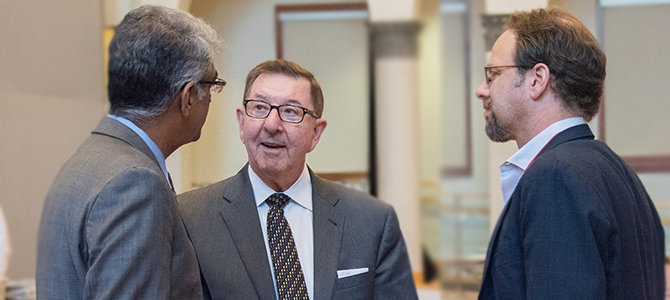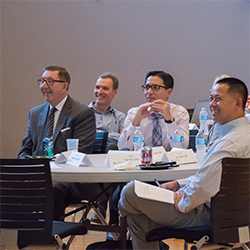
New Faculty Mentoring Program is Meant to Inspire

The College of Medicine – Phoenix Faculty Development Committee launched its new mentoring program Aug. 30 with a dinner and keynote address by Sai Parthasarathy, MD, a distinguished physician-researcher specializing in Sleep Medicine.
The program called LIFT, Leading and Inspiring Faculty Trajectories, is derived from evidence-based mentoring practices and literature. It combines traditional mentorship with a peer group dynamic and will run the inaugural cohort through May 2018.
Guadalupe Federico, PhD, assistant dean of Faculty Affairs and Development, said LIFT is a critical component to the career advancement of the College’s faculty because it fosters a relationship between faculty partnerships and peer groups that helps the mentee’s personal and professional development and mentor’s sense of giving back.
“LIFT is designed to enhance the vitality of our faculty by meeting mentoring needs across multiple topics, including research, scholarly writing, teaching, clinical skills and personal and professional growth,” she said.
The inaugural mentors are Jonathan Lifshitz, PhD; Maria Manriquez, MD; Robert Roberts, MD, and Terrence Stull, MD. Each will be assigned between five and seven junior faculty mentees, based on their career development needs. Twenty-three faculty members have expressed interest in participating as mentees.
Junior faculty members who hold an assistant or associate faculty title on any track with the University of Arizona College of Medicine – Phoenix (full- or part time) are eligible to join as a mentee. Full professors generally participate as mentors.
“The academic medical system can be a difficult system to navigate through, so having mentors in place can help guide our faculty,” said Kenneth S. Knox, MD, Faculty Affairs associate dean.
Dr. Martinez said the program’s goal is to provide career development and support for faculty through the group model along with a series of structured evening presentations and networking events throughout the year with guest faculty speakers from local and national institutions.
“It also, hopefully, will provide a moral support component,” she said.
Dr. Lifshitz said he volunteered as a mentor because he has been “extraordinarily fortunate to have had four principle mentors in my academic career that were instrumental in helping me achieve the success that I have today. So that means I have to pay it back ten- or twenty-fold, or about 80 or so that I would need to mentor in order to pay back that debt.”
In his remarks to attendees at the opening dinner, Dr. Parthasarathy said a mentoring relationship is “the fabric that holds academic institutions together in terms of cross-pollinating ideas so people don’t have to relearn the lessons that were already learned previously.”
He is Interim Division Chief of Pulmonary, Critical Care, Adult Allergy and Sleep Medicine at the University of Arizona College of Medicine – Tucson. He was a contributing chapter author for the book, “A Guide for Developing, Writing & Implementing Scientific Research Grant Proposals,” which discusses the importance of mentors and collaborators for successful career development among MD and PhDs. In 2016, he was awarded the College of Medicine – Tucson Dean’s Council on Faculty Affairs’ Faculty Mentoring Award.
More information about the LIFT program. If you would like to participate as a mentee or mentor next Fall, contact the Office of Faculty Affairs and Development.
Topics
About the College
Founded in 2007, the University of Arizona College of Medicine – Phoenix inspires and trains exemplary physicians, scientists and leaders to advance its core missions in education, research, clinical care and service to communities across Arizona. The college’s strength lies in our collaborations and partnerships with clinical affiliates, community organizations and industry sponsors. With our primary affiliate, Banner Health, we are recognized as the premier academic medical center in Phoenix. As an anchor institution of the Phoenix Bioscience Core, the college is home to signature research programs in neurosciences, cardiopulmonary diseases, immunology, informatics and metabolism. These focus areas uniquely position us to drive biomedical research and bolster economic development in the region.
As an urban institution with strong roots in rural and tribal health, the college has graduated more than 1,000 physicians and matriculates 130 students each year. Greater than 60% of matriculating students are from Arizona and many continue training at our GME sponsored residency programs, ultimately pursuing local academic and community-based opportunities. While our traditional four-year program continues to thrive, we will launch our recently approved accelerated three-year medical student curriculum with exclusive focus on primary care. This program is designed to further enhance workforce retention needs across Arizona.
The college has embarked on our strategic plan for 2025 to 2030. Learn more.